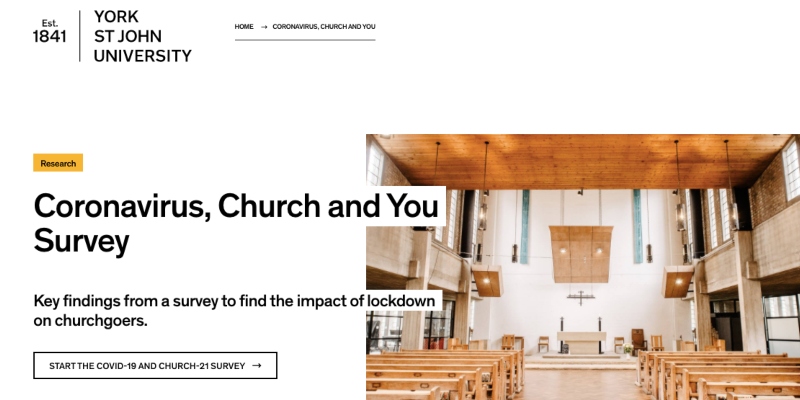The Baptist experience of the first national lockdown
Ahead of a new survey, Andrew Village and Leslie J. Francis of York St John University outline their findings from a survey conducted following the first lockdown

When the first lockdown came into force last year, we launched the Coronavirus, Church & You survey to try and get an initial understanding of how such an unprecedented event was affecting churchgoers. The aim of the survey was to try to reach a large sample of clergy and lay people and ask them not just what they did but also what they felt about the experience, and what they thought the future might hold.
Little did we know that, almost a year later, we would be in yet another lockdown and the same questions would still be important to answer. How well did people cope with the pandemic? Did it strengthen or weaken their faith? How was it for clergy and ministry teams trying to work in this new environment? How have those receiving ministry found this novel experience? Will virtual ministry become part of the post-pandemic landscape, and will this be a good move for churches?
Although the survey was run mainly among Anglicans in the Church of England, it attracted interest from other denominations, including Baptists. We have given full details of the survey and the results in our survey webpage.
This article summarises a report on the 259 Baptists who took part in the survey. In the report, we compare their answers to 5741 Anglicans who took the same survey so that we can get some idea of what was shared and what was distinctive about the experience of the pandemic in the two traditions.
First, as you might expect, the experience of the virus itself and the effects of lockdown on wellbeing were mostly similar between the two denominations. A person’s denomination did not affect the likelihood of infection, nor how lockdown influenced changes in their emotional or spiritual state.
There was one area where Baptists may have fared better than Anglicans, and that was in feeling closer to, rather than further from, their church. Whereas 30 per cent of Baptists reported feeling closer to church (and the same proportion reported feeling further from church), among Anglicans a lower proportion felt closer to church (22 per cent) and a higher proportion felt further from church (39 per cent). Baptist congregations may have been better at keeping in touch during lockdown.
Second, Baptists receiving ministry were more likely to access worship outside their denomination (43 per cent compared to 19 per cent of Anglicans). This might point to the greater overlap of Baptist liturgical practice with other Free Church or Evangelical denominations compared with the more particular liturgical worship in Anglican churches. Baptists were more positive about the quality of the online worship they accessed (57 per cent thought it was ‘professional’, compared to 47 per cent of Anglicans).
Furthermore, 19 per cent thought it was better than services before lockdown, 67 per cent about the same, and only 14 per cent thought the services were worse. Comparable figures for Anglicans were 13 per cent better, 59 per cent same, and 28 per cent worse. More Baptists than Anglicans indicated they might use online worship after lockdown (59 per cent versus 45 per cent), though very few at all would move entirely to online services if they could.
Third, when it came to offering worship, Baptists tended to offer services of the Word most often, but many did offer Holy Communion on at least some Sundays. Interestingly, they were far more likely to invite participation at home, something that was also true of Evangelical Anglicans, but not Anglo-catholics. Ironically, it was those traditions that most revere Eucharistic worship who found it hardest to offer it to lay people during lockdown. Baptists seemed better placed to develop shared virtual Communion because of their inherited beliefs and practices.
Fourth, support for those receiving and giving ministry seemed to reflect similar patterns in both denominations. Sources close to home were those most often used and were often the most effected means of support. One difference that did emerge was the greater sense of being well-supported by their church nationally among Baptists than among Anglicans (24 per cent versus 14 per cent for those receiving ministry, and 52 per cent versus 24 per cent for those giving ministry in lockdown). Baptists may have something to teach Anglicans here. Baptists were generally more likely to think their denomination had responded well to the crisis than did Anglicans.
Fifth, the different attitudes towards the place of church buildings, and the effect of their closure, emerged clearly in our data. Baptists were generally more supportive of closing churches during lockdown (78 per cent versus 52 per cent of Anglicans), probably because they did not view buildings as being as important to faith as did some Anglicans. These were beliefs that shared more closely with Evangelical than Anglo-catholic Anglicans.
Sixth, Baptists were generally more positive about the benefits of lockdown in promoting change and making churches adjust to the digital age. Neither denomination was keen on replacing face-to-face church with virtual church, but Baptists were more apt to recognise the potential benefits of some forms of virtual church.
In both denominations around half thought social media was a great pastoral tool, but there was more disparity when it came to online worship being a great liturgical tool (68 per cent of Baptists versus 59 per cent of Anglicans) or social media being a great evangelistic tool (68 per cent of Baptists versus 44 per cent of Anglicans). This suggests Baptists generally had a slightly more positive view of virtual church, something that emerged in statements that looked forward to a future where online church was more normal.
Baptists were more likely to agree that they would learn how to be Church appropriately in the digital age (53 per cent versus 38 per cent of Anglicans), and they were slightly more positive about the possibility of central online services improving the quality of worship (19 per cent versus 14 per cent of Anglicans), though not convinced about any centralisation of pastoral care. In both denominations, while around a third thought there would be more pastoral work done online, only around 13 per cent thought centralising this would improve the quality.
Overall, Baptists, while they shared many things in common with Anglicans during the lockdown, seemed to have beliefs and practices that made it easier for them to live out faith without buildings and by engaging with the wider world of online churches. They seemed to more positive about the support they received from their local congregations and the denomination nationally.
Our follow-up survey, Covid-19 & Church-21, is looking in a more focused way at what it has been like to prepare or access worship (online or socially distanced in church), how wellbeing has changed in this lockdown, and people’s beliefs and opinions about what the future holds.
 We would be delighted to have as many Baptists as possible take part so that we can build on what we have reported here. You can go to our webpage for more details, access the survey directly at https://tinyurl.com/y4fqgrzq or scan this QR code with your smart phone:
We would be delighted to have as many Baptists as possible take part so that we can build on what we have reported here. You can go to our webpage for more details, access the survey directly at https://tinyurl.com/y4fqgrzq or scan this QR code with your smart phone:
The Revd Andrew Village (Professor of Practical and Empirical Theology, York St John University)
The Revd Canon Leslie J. Francis (Visiting Professor of Theology and Religious Studies, York St John University)
Baptist Times, 12/03/2021